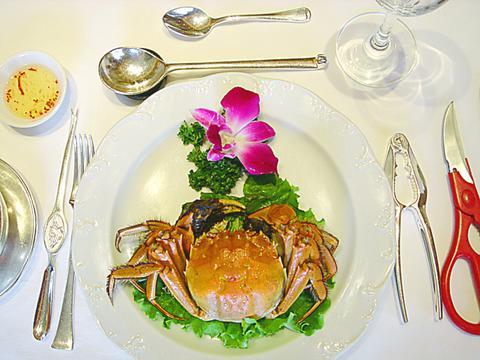Shanghai crabs (
An opaque, plastic ring guaranteeing authenticity is attached to the live crab's claw because there are so many imitations out there masquerading as the real thing. Only Yangcheng Lake crabs, which have golden hairs on their claws, are a green-blue color and white underneath (until they are boiled) are the real deal.

PHOTO: JULES QUARTLY, TAIPEI TIMES
Weighing about 220g to 250g, the luxury decapods have a subtle and refined taste that gets gourmands salivating. The ovaries, eggs and digestive glands of the female crab are particularly valued.
Chef Lam Yau Chang (
The meal starts on a subtle note with chrysanthemum tea, which perks up the taste buds without overcoming them. There are seven courses, but the steamed Shanghai crab served up whole with a delicate honey and lemon sauce rightly claims center stage. The rest of the menu frames the crab dish.
The starters of sauteed scallops with seasonal greens are followed by a large pan-fried king prawn in sweet and hot sauce. Then comes the snow frog soup with bamboo pith and beef rolls with wild mushroom. Taro cake and dessert finishes off the meal.
Apart from the Shanghai crab, Chef Lam's recommendation is the king crab. The various parts of the 1kg sea monster are served up in different styles. The starter is "live crab meat salad," which is a par-boiled claw pan-fried with Japanese seasoning. The standout dish, however, is the next course, deep fried king crab legs coated in a delicate yam flour so fine it's practically transparent and dusted with shrimp eggs. The wasabi, interestingly, does not camouflage the flavor of the crab, but instead brings it to the foreground.
In addition there are braised pea shoots with crab, crab claw soup with crystal noodles and crab dumplings, followed by a fresh fruit dessert.
For the finale, we were served up ginger tea to heat up the body (crabs cool it) and restore the body's balance of yin and yang. "Western chefs create just for the tastebuds," says Lam. "We Chinese chefs also think about the taste, smell and look. But we also consider what is good for your health and how to create a balanced meal."
This is fine dining at its freshest and best.

June 2 to June 8 Taiwan’s woodcutters believe that if they see even one speck of red in their cooked rice, no matter how small, an accident is going to happen. Peng Chin-tian (彭錦田) swears that this has proven to be true at every stop during his decades-long career in the logging industry. Along with mining, timber harvesting was once considered the most dangerous profession in Taiwan. Not only were mishaps common during all stages of processing, it was difficult to transport the injured to get medical treatment. Many died during the arduous journey. Peng recounts some of his accidents in

“Why does Taiwan identity decline?”a group of researchers lead by University of Nevada political scientist Austin Wang (王宏恩) asked in a recent paper. After all, it is not difficult to explain the rise in Taiwanese identity after the early 1990s. But no model predicted its decline during the 2016-2018 period, they say. After testing various alternative explanations, Wang et al argue that the fall-off in Taiwanese identity during that period is related to voter hedging based on the performance of the Democratic Progressive Party (DPP). Since the DPP is perceived as the guardian of Taiwan identity, when it performs well,

The Taiwan People’s Party (TPP) on May 18 held a rally in Taichung to mark the anniversary of President William Lai’s (賴清德) inauguration on May 20. The title of the rally could be loosely translated to “May 18 recall fraudulent goods” (518退貨ㄌㄨㄚˋ!). Unlike in English, where the terms are the same, “recall” (退貨) in this context refers to product recalls due to damaged, defective or fraudulent merchandise, not the political recalls (罷免) currently dominating the headlines. I attended the rally to determine if the impression was correct that the TPP under party Chairman Huang Kuo-Chang (黃國昌) had little of a

At Computex 2025, Nvidia CEO Jensen Huang (黃仁勳) urged the government to subsidize AI. “All schools in Taiwan must integrate AI into their curricula,” he declared. A few months earlier, he said, “If I were a student today, I’d immediately start using tools like ChatGPT, Gemini Pro and Grok to learn, write and accelerate my thinking.” Huang sees the AI-bullet train leaving the station. And as one of its drivers, he’s worried about youth not getting on board — bad for their careers, and bad for his workforce. As a semiconductor supply-chain powerhouse and AI hub wannabe, Taiwan is seeing